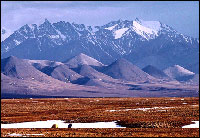Beltway insiders waited with bated breath yesterday to see if Sen. Peter Domenici (R-N.M.) would succeed in tacking his stalled-out energy bill onto the huge highway transportation bill now wending its way through Congress. The consensus from his Senate Republican colleagues? No deal.

In need of refuge.
Photo: FWS.
But another cockamamie plan that would mingle energy policy and transportation funding is in the works. In an open letter prominently featured on the website of the House Resources Committee earlier this week, Committee Chair Richard Pombo (R-Calif.) proposed opening Alaska’s Arctic National Wildlife Refuge to oil and gas exploration and (here’s the new twist) funneling the proceeds toward the whoppingly expensive — and whoppingly popular — transportation bill, which congressional leaders are trying to whittle down from its original $318 billion cost.
Pombo’s letter was addressed to Rep. Don Young (R-Alaska), chair of the House Transportation Committee and a big supporter of ANWR drilling. Young himself had advanced a surprisingly progressive proposal to finance the transportation package with an 8-cent-per-gallon increase in the federal gas tax (now 18.3 cents per gallon), but his idea was shot down by House GOP leaders and President Bush, so he’s desperate for an alternative. Pombo’s plan, though, is unlikely to be the ticket.
“What makes this idea so absurd is that the oil industry itself has admitted that there’s no way of getting revenues from ANWR drilling for at least 10 years — if at all — and the transportation bill needs funding starting now,” said Kevin Curtis, vice president of National Environmental Trust. “It’s a nice rhetorical proposal, but Pombo knows it’s dead on arrival.”
Pombo’s plan is so off-the-wall, in fact, that Curtis thinks it may be a spoof — just like a tongue-in-cheek announcement last week that Pombo may propose a bill that would ban construction of most tall buildings in response to a study by an environmental group that found a lot of birds are killed every year when they slam into skyscrapers’ windows.

